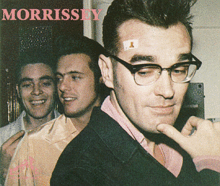We Hate It When Our Friends Become Successful
| "We Hate It When Our Friends Become Successful" | ||||
|---|---|---|---|---|
 | ||||
| Single by Morrissey | ||||
| from the album Your Arsenal | ||||
| Released | 27 April 1992 | |||
| Format | 7", 12", CD, cassette | |||
| Genre | Alternative rock | |||
| Length | 2:30 | |||
| Label | HMV (UK) | |||
| Writer(s) | Morrissey, Alain Whyte | |||
| Producer(s) | Mick Ronson | |||
| Morrissey singles chronology | ||||
| ||||
| Professional ratings | |
|---|---|
| Review scores | |
| Source | Rating |
| AllMusic | |
"We Hate It When Our Friends Become Successful" is a single by Morrissey released in April 1992. It was taken from the then-unreleased Your Arsenal album and was the first Morrissey single to be written by Alain Whyte and produced by glam rock legend Mick Ronson.
Reaching number 17 in the UK Singles Chart, the song shows a harder edge to Morrissey's sound and moves away from the lighter pop of his 1991 album Kill Uncle.
The Swedish synthpop band Universal Poplab covered the song on their 2004 debut eponymous album, in a duet with the Swedish pop singer Håkan Hellström.
Reel Big Fish covered the song on their 2005 album We're Not Happy 'til You're Not Happy, replacing the lyric "And if they are Northern" with "And if they are No Doubt".
Morrissey claimed that the lyrics were about the music scene in Manchester, with bands contesting for success.
On hating it when his friends become successful, he said: "When my old friend Simon Topping [the frontman of Manchester band A Certain Ratio] appeared on the cover of the NME, I died a thousand deaths of sorrow and lay down in the woods to die."
Track listings
7" vinyl and cassette
- "We Hate It When Our Friends Become Successful"
- "Suedehead" (live London 4/10/91)
12" vinyl (UK)
- "We Hate It When Our Friends Become Successful"
- "Suedehead" (live London 4/10/91)
- "I've Changed My Plea to Guilty" (live London 4/10/91)
- "Pregnant for the Last Time" (live London 4/10/91)
CD (UK)
- "We Hate It When Our Friends Become Successful"
- "Suedehead" (live London 4/10/91)
- "I've Changed My Plea to Guilty" (live London 4/10/91)
- "Alsatian Cousin" (live London 4/10/91)
12" vinyl and CD (USA)
- "We Hate It When Our Friends Become Successful"
- "Suedehead" (live London 4/10/91)
- "I've Changed My Plea to Guilty" (live London 4/10/91)
- "Pregnant for the Last Time" (live London 4/10/91)
- "Alsatian Cousin" (live London 4/10/91)
| Country | Record label | Format | Catalogue number |
|---|---|---|---|
| UK | HMV | 7" vinyl | POP1629 |
| UK | HMV | 12" vinyl | 12POP1629 |
| UK | HMV | Compact disc | CDPOP1629 |
| UK | HMV | Cassette | TCPOP1629 |
Etchings on vinyl
British 7" and 12": I DO NOT KNOW ANYONE THAT IS HAPPY DO YOU/none [2]
Reviews
Andrew Collins in NME gave a very negative review of the single, writing that "this is by far and away the ex-Smith's WORST single" and described the music as "the sound of five men bashing around in the darkness in search of a tune" before finishing the review by announcing "Moz is history, and we'd all do well to learn it."[3] Ned Raggett of AllMusic wrote, "It may be a mouthful, but as delivered it becomes a wonderfully funny, intentionally bitchy sentiment for this EP's lead track."[1]
Musicians
- Morrissey: voice
- Alain Whyte: guitar
- Boz Boorer: guitar
- Gary Day: bass guitar
- Spencer Cobrin: drums
Live performances
The song was debuted on the second US leg of his tour promoting the Kill Uncle album. The first half of the song was performed during the aborted gig at Pauley Pavilion, Los Angeles, in 1991, in which 48 people were injured as the crowd rushed the stage.[4] It was then performed in concert for the duration of his tour in 1992 promoting Your Arsenal. Fellow Manchester band James performed it as a set opener when standing in for Morrissey at Glastonbury, with frontman Tim Booth stating beforehand that "this is our Morrissey impression".
See also
References
- 1 2 Raggett, Ned. "We Hate It When Our Friends Become Successful Review". AllMusic. Retrieved October 29, 2012.
- ↑ Passions just like mine
- ↑ NME We Hate It When Our Friends Become Successful Review
- ↑ http://articles.latimes.com/1991-11-03/local/me-1598_1_pop-singer
External links
- "We Hate It When Our Friends Become Successful" at Passions Just Like Mine
- "We Hate It When Our Friends Become Successful" Review at AllMusic
- Lyrics of this song at MetroLyrics